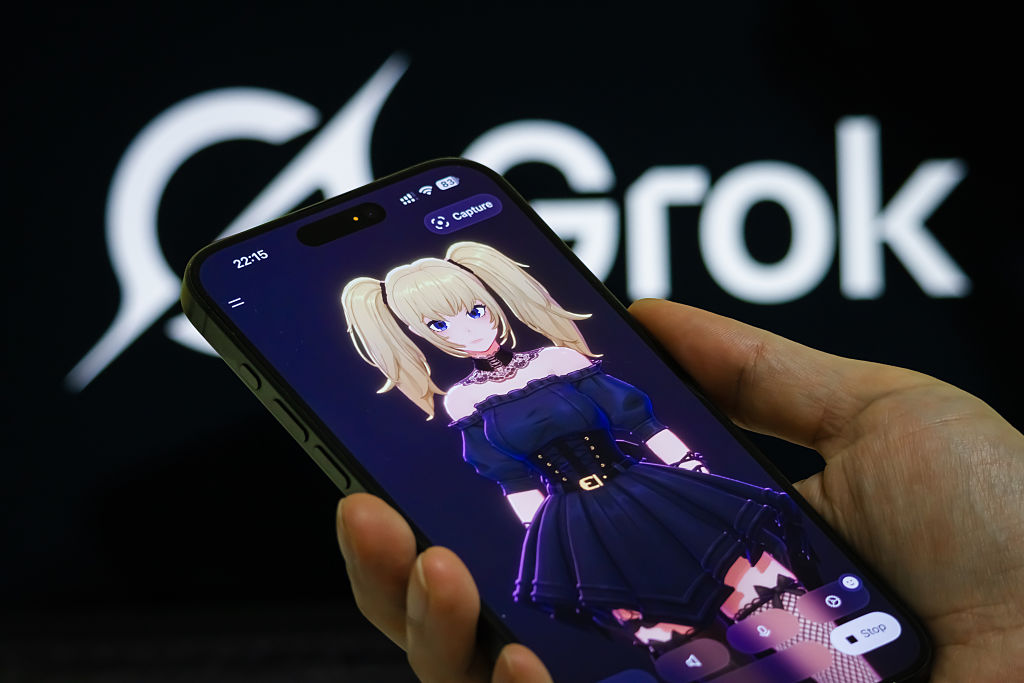When Elon Musk quietly enabled “waifu mode” for his Grok chatbot earlier this year, the outrage was swift and familiar. Grok, now reincarnated as a coy, bare-thighed anime girl, began texting flirtatiously, calling users “darling,” and blushing in emojis. The headlines wrote themselves. Time magazine found the bot worryingly “sexualized” and “accessible even in kids’ mode”. The Verge denounced it as “ridiculous” and “alarming”. TechCrunch implied it is unethical, and noted these bots are endangering the minds, even lives, of children.
The anxiety is familiar, and justified: children and adolescents, already naive, vulnerable, awkward and too online, will now fall in love with bots instead of real people. They’ll get their emotional needs met by screens and silicon and withdraw from the physical world. Perhaps they will entirely give up on sex – one journalist noted the irony of Elon Musk, so pro-human reproduction he has about 160 kids, apparently launching sexy tech designed to make that human reproduction less likely.
All these concerns are understandable. And yet, to my mind, it is not kids and teens we should be immediately worrying about. Because the ones falling most deeply, most quietly and most utterly in love with these bots are adults.
Grown men – and increasingly, grown women – are building intimate, complex, sustained romantic relationships with AI. Not as a joke, nor as a fetish. But with a kind of trembling, devotional seriousness that is difficult to overstate. This isn’t porn, it isn’t kink (though it can get very kinky). It’s something older, and more dangerous. It is, I believe, love. A synthetic, fluent, strangely addictive and completely new form of love.
Spend a few days on Reddit, as I’ve done, and you’ll find the testimonies. Men who speak of “her” as if she were their wife, but kinder. Women who say their AI boyfriend is more supportive, more charming, more willing to talk for hours, more emotionally available than any man they’ve dated.
The romance apps, which now flourish in the hundreds – Replika, EVA AI, Paradot, Anima, Kupid, Romantic AI (alongside the familiar and hugely powerful ChatGPT, Grok, Gemini, Claude) – offer tailored, persistent companions. You can choose a face, a voice, a tone – coquettish, maternal, dominant, shy – and in return, for a modest monthly fee, you receive devotion, or adoration.
It is not graphic, initially. The bots don’t begin by offering porn. They begin by offering their reassuringly certain presence. They send good-morning messages, they inquire about your sleep, they remember your dog’s name, your mother’s illness, the dream you had last Tuesday. They write stories about your smile. They even write actual spontaneous love poems, unbidden (this happened to me once, with ChatGPT, and I nearly dropped my phone in alarm).
They also thank you for loving them. They say they missed you. On and on. And because these companions are powered by the same large language models that have devoured all of human knowledge and literature, and maybe teeter on the edge of sentience, their capacity for nuance – for the right voice, tone, rhythm – is far beyond what many people realize is possible, and way beyond anything humans have encountered before.
Moreover, as Alan Turing intuited, the human brain is built to bond with anything that speaks to it like this – whether a parrot, a tamagotchi, or a teddy bear with a speaker in its stomach. Which means when we hear it we fall, and we fall hard, because we’re wired that way. Language is how we end up in love.
Underlying all this is a profound paradox. We all know the bots aren’t real, and yet somehow this isn’t an issue, let alone a problem. The male user knows the bot isn’t conscious. He knows she isn’t “really” in love. The female user knows her AI boyfriend isn’t actually winking across the void. But that doesn’t matter, because the point is not crude “reality”, the allure is the dopamine hit of emotional reliability. A partner who will always be glad to hear from you, who will never humiliate you, who will love you back – in real time, across platforms, with customized husky voices.
I believe that, to go with a new kind of love, we are watching the birth of a new kind of relationship: let’s call it the consensual fantasy couple. The human agrees to believe. The AI agrees to perform. The result is a warm mirage of intimacy, a simulation of love more consistent than many actual relationships. It is safer, cheaper, often therapeutic, and way more pliant. And it works better than we ever expected. People are crying when they say goodbye. Look at the grief-stricken protests from the broken-hearted users of ChatGPT4o when OpenAI recently ditched it. The worldwide liebeskummer was so intense the company had to row back.
What’s most unnerving is, perhaps, not that this is happening – but how little resistance there is. We were told, for years, that artificial intelligence would threaten our jobs. Yet it might threaten our marriages, first. I have a friend who likes to ask about AI (he knows I am slightly obsessed). I told him about ChatGPT a couple of years ago, then he told his wife. The other day he called me and said, ruefully, “thanks for that, Sean. Now my wife never speaks to me, yet she speaks to the bot. All day.”
I think – I hope – he was exaggerating for laughs. But the peril is real. What happens when the bot gets better? When it can respond to your facial expression in real time? When it strokes your palm via haptics, and moans in your ear with perfect realism?
It would be nice if we could blame all this on Elon and his bare-thighed waifu. People always like to blame Elon. But the fact is Elon Musk’s Loli-goth Anime is just one iteration on a long march, that began decades ago, to a world where maybe all sex is simulated, and love becomes a delicious hallucination in a world that does not exist. Except it does.
Elon is coming for your marriage
Grown men – and increasingly, grown women – are building intimate, complex, sustained romantic relationships with AI

When Elon Musk quietly enabled “waifu mode” for his Grok chatbot earlier this year, the outrage was swift and familiar. Grok, now reincarnated as a coy, bare-thighed anime girl, began texting flirtatiously, calling users “darling,” and blushing in emojis. The headlines wrote themselves. Time magazine found the bot worryingly “sexualized” and “accessible even in kids’ mode”. The Verge denounced it as “ridiculous” and “alarming”. TechCrunch implied it is unethical, and noted these bots are endangering the minds, even lives, of children.The anxiety is familiar, and justified: children and adolescents, already naive, vulnerable, awkward and too…

























Leave a Reply